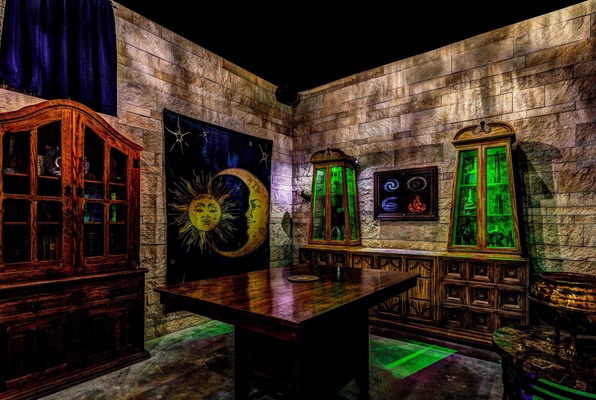Opening the Educational Conveniences of Escape Room Difficulties
Incorporating escape room difficulties right into educational frameworks provides an unique chance to improve critical thinking, promote synergy, and create problem-solving skills amongst trainees. These engaging activities imitate real-world scenarios, fostering an atmosphere of energetic understanding where theoretical ideas change right into practical applications. By merging enjoyment with education and learning, escape rooms not only increase student interaction however likewise prepare them for future obstacles, calling for strength and cooperation. As we discover the complex advantages of this cutting-edge approach, one must consider how these immersive experiences can reshape traditional learning paradigms. What further potential does this approach hold for the scholastic globe?
Enhancing Crucial Thinking
Escape area challenges function as a interesting and dynamic tool for boosting critical believing abilities. These immersive experiences require participants to address a series of puzzles and puzzles within an established timeframe, promoting a setting where cognitive abilities are rigorously evaluated and created. The nature of escape rooms requires an organized method to analytical, motivating people to evaluate information critically, acknowledge patterns, and attract sensible verdicts.
Individuals in escape room difficulties are commonly confronted with intricate problems that require innovative services, consequently advertising lateral thinking. This kind of thinking is essential for determining connections between apparently unrelated ideas and for creating imaginative options. Furthermore, the stress of a ticking clock includes a component of urgency, pushing individuals to think both promptly and properly.
Furthermore, escape space difficulties commonly include a selection of problems that attract various cognitive strengths, such as sensible thinking, spatial recognition, and mathematical skills. This diversity makes sure that participants work out a wide variety of mental professors, which is key to detailed cognitive development. In significance, retreat rooms develop a revitalizing atmosphere that not just amuses but additionally grows crucial critical thinking capacities, making them an important instructional tool.
Promoting Synergy
Working together successfully is a critical component of success in escape room challenges, as these activities naturally require cooperation among individuals. The structured setting of an escape area demands that people merge their varied skills, understanding, and point of views to solve intricate issues within a limited duration. This collaborative method cultivates an understanding of the importance of each employee's contributions, consequently improving interpersonal skills and mutual respect.
In an instructional context, escape areas serve as a dynamic platform for advertising teamwork amongst pupils. By participating in these obstacles, trainees discover to connect better, delegate tasks based upon individual staminas, and assistance one an additional under stress - escape room orlando fl. These experiences equate into improved team dynamics in classroom setups, where participating learning is important for academic success
Additionally, the immersive and interactive nature of escape spaces offers a useful, hands-on experience that reinforces academic ideas related to synergy. It permits participants to exercise and refine vital soft abilities, such as management, energetic listening, and dispute resolution. As an outcome, getaway room challenges not only make finding out pleasurable however likewise prepare trainees for future real-world situations where team effort is crucial.
Developing Problem-Solving Abilities
Creating analytic abilities with getaway space challenges provides a engaging and unique method for honing critical assuming capacities. These interactive settings existing participants with a series of detailed problems and situations that need analytical and innovative approaches to solve. By browsing these difficulties, individuals are forced to believe outside advice the box, adjust swiftly to new information, and use rational reasoning in real-time.

The hands-on nature of escape space difficulties fosters a sense of urgency and exhilaration, which can considerably boost trainee inspiration. When students are participated in a story that requires them to fix you could try these out puzzles and get rid of challenges, they are much more most likely to invest initiative and excitement into the discovering jobs. This increased involvement can lead to deeper understanding and retention of the material, as trainees are called for to use their knowledge in real-time situations.
Moreover, the collaborative facet of retreat spaces promotes teamwork and interaction abilities. Integrating escape area obstacles into educational setups can be an effective technique to elevate student involvement and drive academic achievement.
Verdict

Incorporating retreat area challenges right into academic structures provides a distinct possibility to improve critical reasoning, promote team effort, and develop analytic skills amongst trainees. As an outcome, escape area challenges not just make learning satisfying but likewise prepare students for future real-world situations where synergy is important.
Involving trainees in the understanding process is important for academic success, and leave area challenges use an engaging service to this instructional vital. Incorporating escape space obstacles into educational setups can be an effective strategy to elevate trainee involvement and drive academic achievement.
The dynamic nature of getaway areas effectively gears up trainees with crucial skills for academic and real-world success, eventually enhancing the instructional experience and preparing students for future challenges.